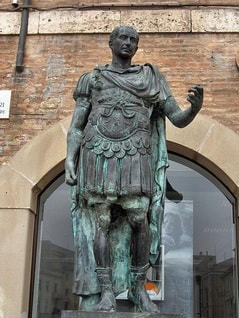Social Studies
Explore Ancient History - Roman Empire
Have students build a family tree of the Caesars prior to and post Julius. Make a list of their lasting accomplishments (the “good”) and their dastardly deeds (the “bad”). Take the activity a step further and analyze the results of the lists , looking for patterns or conclusions that can be drawn.
Explore the influence of Julius Caesar
Who was he? Why do we still learn about him, more than 2,000 years after his death? Why is he connected to the famous playwright, Shakespeare?
Explore the nature of the Roman Republic
Why are Ancient Rome and Ancient Greece referred to as the cradle of Democracy? What elements started in these civilizations are cornerstones of the US government? How exactly did the Roman system of government work? What was the downfall of the Roman Republic?
STEM
Explore measurement of time
The nature of time is a complex concept. Run a student “think tank” about the different ways that time is measured. What are the pros and cons of the calendar we use? Ask students to collaborate to design a “better” system.
Explore the lunar cycle
Use this Minute to take your students on an astronomical lunar adventure. What is the cycle? Why isn’t it consistent? Why does the moon have phases? How are the moon’s phases connected to ocean tides? What do eclipses have to do with the moon?
Explore Ancient History - Roman Empire
Have students build a family tree of the Caesars prior to and post Julius. Make a list of their lasting accomplishments (the “good”) and their dastardly deeds (the “bad”). Take the activity a step further and analyze the results of the lists , looking for patterns or conclusions that can be drawn.
Explore the influence of Julius Caesar
Who was he? Why do we still learn about him, more than 2,000 years after his death? Why is he connected to the famous playwright, Shakespeare?
Explore the nature of the Roman Republic
Why are Ancient Rome and Ancient Greece referred to as the cradle of Democracy? What elements started in these civilizations are cornerstones of the US government? How exactly did the Roman system of government work? What was the downfall of the Roman Republic?
STEM
Explore measurement of time
The nature of time is a complex concept. Run a student “think tank” about the different ways that time is measured. What are the pros and cons of the calendar we use? Ask students to collaborate to design a “better” system.
Explore the lunar cycle
Use this Minute to take your students on an astronomical lunar adventure. What is the cycle? Why isn’t it consistent? Why does the moon have phases? How are the moon’s phases connected to ocean tides? What do eclipses have to do with the moon?
© Karen Sterling, 2017 - May be used for educational purposes without written permission



